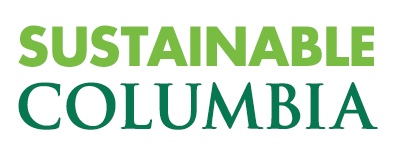Overview
Universities are uniquely poised to pursue a multidisciplinary approach for engaging students and faculty to help solve real-world problems on campus. Using campus as a living lab helps to foster collaboration between students, faculty, and staff, brings the cutting-edge research of the University to the operations of campus, and provides a chance to teach students to be sustainability leaders of the future.
To foster a culture of sustainability for faculty and staff within workspaces on Columbia’s campuses, the first plan called for the creation of the Sustainable Leaders Network and corresponding Workplace Certification Program. This program has engaged over 200 active participants across all campuses on an individual and departmental level.
To engage students, the University frequently serves as a client for student capstone and senior thesis projects. This allows for a deeper understanding of the operations of the University, and applies the talented minds of Columbia students in solving real-world problems.
Enhance the sustainability literacy of the University community.
- Collaborate with the Student Campus Culture group, formed as part of the Plan 2030 planning process, to curate ideas for the development of a student sustainability literacy program that will educate all Columbia students about the basics of climate change, how Columbia is taking action, and what students can do to take action themselves.
- Phase I: (Spring 2021) Develop a proposal that outlines:
- Mechanisms for reaching the student body (format of the program).
- Communication plan for outreach to students.
- Phase II: (Fall 2021) Prepare program and plan for launch.
- Phase III: (By 2023) More robust, mature program is in place. Continue to monitor each year.
Empower students to identify and implement mechanisms to change the culture on campus.
- Expand methods for students to engage with campus operations each semester, through capstone work, senior theses, or other opportunities.
- Build a demonstration project where students can engage with campus to better understand operations by 2022.
Since the launch of the first sustainability plan, the Sustainable Leaders Network Workspace Certification program has grown to over 200 active participants from the Morningside, Manhattanville, and Medical Center campuses. The University has also actively engaged with students through graduate and undergraduate capstone projects and senior theses, exploring a range of topics from water conservation to transportation emissions reduction strategies.
CUIMC is aligned with all stated goals and strategies in this section.
LDEO is aligned with all stated goals and strategies in this section.
Topics: Culture Change & Campus as a Living Lab
Recent News: Culture Change & Campus as a Living Lab
Columbia University Commits to Reducing Food-Related Carbon Emissions by 25 Percent by 2030
Joins NYC Mayor’s Office at Plant-Powered Carbon Challenge Launch
Reflections from Daniel and Edgar on their Internship Experience
Daniel and Edgar, Sustainable Development undergraduates from the School of General Studies, have both contributed to a variety of projects with the Office of Sustainability during their time as interns. Read below what they've written about their experiences, and what they plan to do next!
Office of Sustainability’s Jessica Prata Speaks at “Everyone Can Teach Climate” Event
The event’s mission of supporting the integration of climate teaching across disciplines and fostering connections to campus as a living lab supports Columbia’s Plan 2030 and the Office of Sustainability’s new implementation pathway Living Net Zero.


